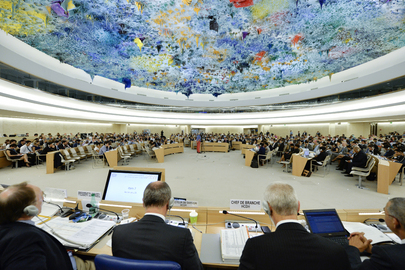UN Human Rights Council holds dialogue on S. Sudan situation
September 18, 2017 (JUBA) – The United Nations Human Rights Council on Monday held an enhanced interactive dialogue on the human rights situation in war-torn South Sudan.

“Civilians bore the brunt of that violence and destruction – the fruit of a deep failure of leadership,” said Gilmore in her opening statement.
She added, “More than a third of South Sudan’s population was displaced by the crisis, of which more than two million were children”.
According to the UN, all parties to the conflict committed gross violations, including widespread sexual violence, enforced disappearances and extra-judicial killings, attacks on humanitarian workers and programmes, and targeting of civilians and civilian objects.
“It was clear that some of those violations could constitute war crimes or crimes against humanity. It was well past time for principled leadership to act in the interest of all South Sudanese,” said Gilmore.
The Chairperson of the Commission on Human Rights in South Sudan, Yasmin Sooka, said that the Hybrid Court for South Sudan needed to be established swiftly, but that the people of South Sudan also needed a commission on truth and healing.
“The national dialogue would not enjoy countrywide support, as there was a prevailing climate of fear. Some argued that justice should wait for peace, but in fact peace and justice had to advance in tandem, otherwise the suffering would continue,” she said.
South Sudan’s Minister of Justice and Constitutional Affairs, Paulino Wanawilla said that since the crisis of 2013, South Sudan had continued to be condemned by some as a country which was rapidly losing its central power and sovereignty.
“The allegations had been exaggerations by those who wanted to make South Sudan their project. Due to the resilience and determination of the leadership and the people of South Sudan, the country continued to maintain its sovereignty, central power, and control of most of its territory,” said the minister.
He, however, emphasized that as a result of the commitment to the implementation of the Agreement on the Resolution of the Conflict in the Republic of South Sudan, a series of institutions had been established, including the Transitional Government of National Unity of the Republic of South Sudan; the Joint Monitoring and Evaluation Commission; and the National Constitutional Review Committee.
The Deputy Chairperson of the Joint Monitoring and Evaluation Commission for the Agreement on the Resolution of the Conflict in South Sudan, Augustino Njorge, explained that the renewed hostilities from July 2016 across South Sudan had resulted in a rapid deterioration of the political, security and humanitarian situation.
“The deterioration covered parts of the country which had been previously peaceful, thereby causing massive internal displacement. Food insecurity and disease had contributed to the worsening of the humanitarian situation,” he told the Human Rights Council.
Meanwhile, Eugene Nindorera, the Director of Human Rights of the United Nations Mission in South Sudan, regretted the continued human rights abuses in South Sudan and the evolution of the conflict in that country.
He said armed opposition fighters used guerrilla tactics, while the Government used a heavy-handed approach towards the population because of their political allegiance or ethnicity.
“The need for more manpower had fuelled forceful recruitment of fighters, including of children by all parties to the conflict. Civilians continued to be detained for years without any access to justice,” he said.
The South Sudanese civil war is a conflict in South Sudan between forces of the government and opposition forces. In December 2013, President Kiir accused his former deputy Riek Machar and ten others of attempting a coup d’état. Since then, the conflict has killed tens of thousands of people and displaced over 2 million.
(ST)
